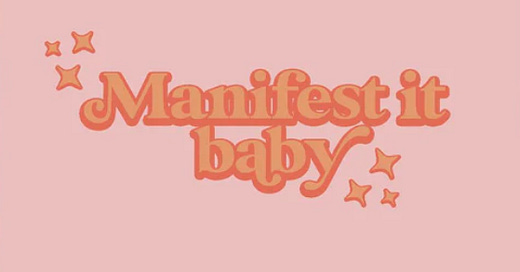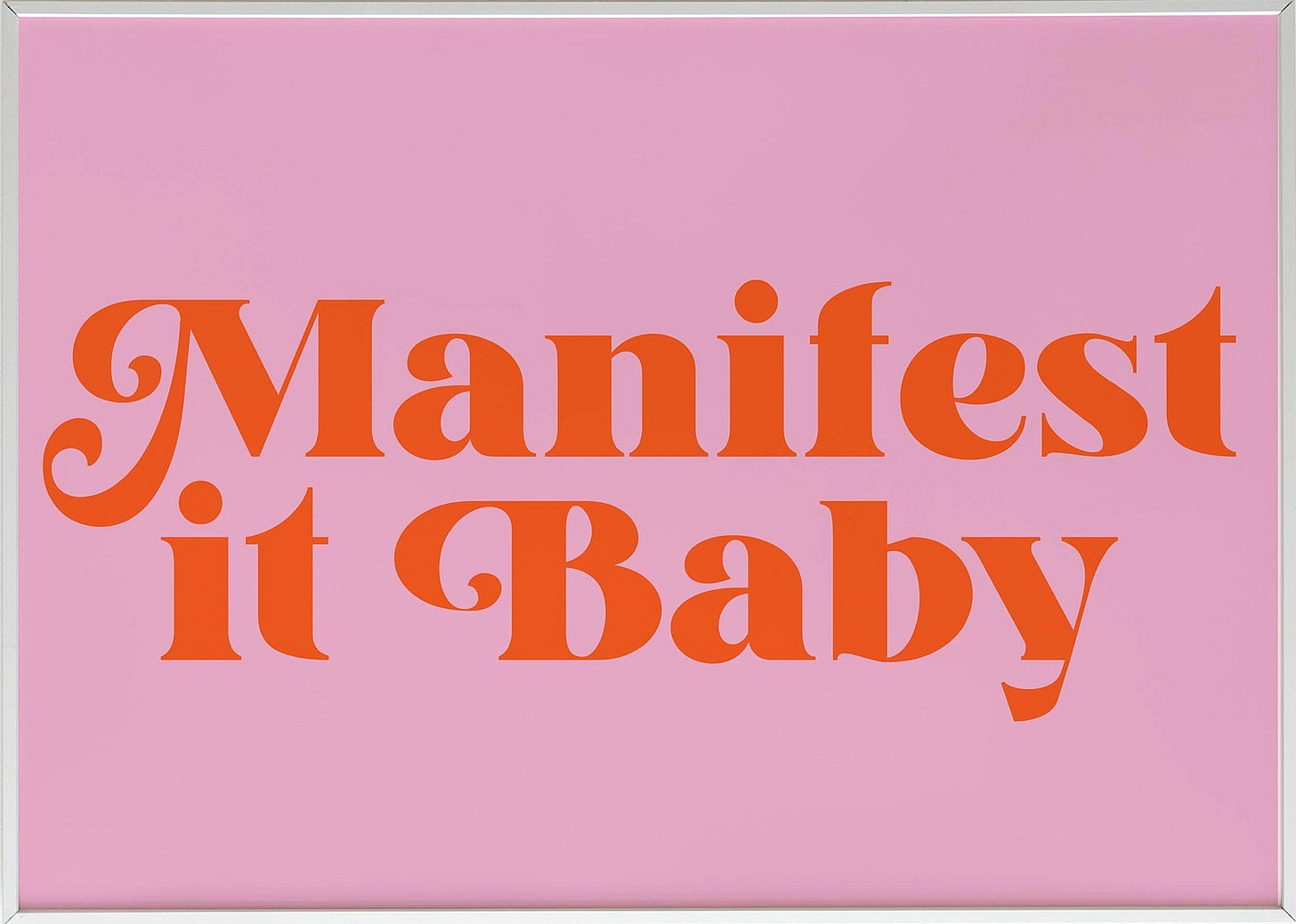When I was thirteen, my mother had a wedding to no one.
She sent invitations to our family, her friends - and the groom. The groom didn’t come. It wasn’t because he’d decided to run out on his engagement - he’d never proposed to my mother to begin with.
As I’ve touched on before in my post astrology babygirl, I grew up with my single mother and her New Age beliefs. At the time of her ‘wedding’, she was really into manifestation and the concept of twin flames (soulmates, only more ‘spiritual’).
My mother felt that Joseph*, the no-show groom, was her twin flame. I think they’d had a brief fling, but he’d refused a relationship with her. So she decided to ‘manifest’ their future together by organising their wedding.
There were flowers, guests, rings and a celebrant. And when the groom didn’t show, my sari-clad mother decided to complete the ceremony anyway and ‘marry herself’.
Her New Age friends embraced her and praised her strength. My Catholic grandmother was mystified (and annoyed she’d travelled interstate to attend). My godmother took me aside and hissed, “I think your mother’s finally lost it.”
Me? I felt humiliated, confused and mad. Despite my mother’s reassurances that it all made sense in some spiritual way, I’d known something was ‘off’ about the event. It broke my faith in my mother’s sanity. I’d known beforehand that it wasn’t a ‘normal’ wedding, and hadn’t wanted to come. (My rebellion was my refusal to dress up - I wore a baggy t-shirt and board shorts.)
After that day, when my friends and teachers at school asked me about my ‘new stepfather’, all I could mumble was, ‘it didn’t work out.’ I couldn’t fathom explaining it.
In hindsight, it seems weird to me that no one removed me from my mother’s care after that. But ‘belief systems’ can be a good cover for underlying mental illness - just look at the case of Ruby Franke, who used Christianity and her cult ConneXions as justifications for horrific child abuse.

It turns out that there are people who’ve done even weirder things than my Mum in attempts to manifest their twin flame relationships, even landing themselves in jail for stalking. Still, that ‘wedding’ was the day my belief in manifestation began to shatter. It made me realise that when people take the tenets of ‘manifestation’ to their full, ‘logical’ conclusions, insane actions can ensue.
Manifestation has been a subject du jour for quite some time. It was in 2007 that I first heard it whispered about outside of my mother’s New Age fringe circles, after the book The Secret was launched into the public consciousness by Oprah.
By the late 2010s, ‘manifestation’ had become a buzzword, used even in brand messaging and business lingo. By 2020, it had achieved thorough mainstream saturation, and become a mantra of influencers everywhere.


Not a lot of people talked about it in the late 90s, though, when I was introduced to it as a child.
I’m someone who grew up with a ‘manifestation mindset’ - ‘before it was cool’, not that that’s a badge of honour.
Manifestation is the belief that people’s focused thoughts can bring about the reality they wish for.
As National Geographic reports, references to manifestation-like principles appear “as early as the Rigveda, a 3,500-year-old Sanskrit text”. These principles were adopted by the western New Age movement, which grew to prominence in the 1980s and 1990s (with roots in 1960s and 1970s counterculture). ‘New Age’ never really went away, but it’s having something of a resurgence in western culture today, particularly with trendy influencers and ‘wellness gurus’.
Though not everyone who’s into manifestation is into other New Age beliefs, the movement is worth touching on as the origin of our current obsession.
As Sounds Like a Cult podcast puts it, the New Age movement incorporates beliefs and behaviours that “co-opt ancient Indigenous and Eastern practices, capitalize upon them and use them to convince Western followers that they are on the brink of a paradigm shift in consciousness and society.” I really cannot put it better than that. When I was growing up, my mother constantly referenced a great ‘shift in consciousness’ that was lurking around the corner. She believed the world would soon ‘transcend’ its obsession with materialism, and achieve collective enlightenment and world peace. By practicing group activities such as meditation, she and her cohort believed themselves to be special ‘light workers’ ushering in this New Age.
Ironically, though the two completely eschew each other, New Age has many parallels with mainstream religion. Manifestation is basically prayer, and material transcendence is basically awaiting the second coming. Both camps have attracted plenty of abusive, power-hungry leaders. It’s funny how similar all cults wind up being in the end. It’s almost like, when you package up the idea of the uncontainable (God) into a container - a set of rules and activities - it immediately loses its essence and becomes corrupt. Just a thought…
There’s certainly a difference between those who dip into manifestation’s aesthetic, distilling it down to a ‘think positively!’ ethos - that’s most people who are into it - and those who brush aside their blond dreadlocks in their yurts to snort manifestation like peyote, claiming a special connection with The One Consciousness. My mum didn’t wear dreadlocks or snort peyote, but she was definitely part of the latter group of people.
We barely scraped by financially some of the time, but ‘money is an illusion’ was one of Mum’s favourite phrases. I remember an incident when she was short on cash, and worrying about how to pay rent. When she found bills totalling eighty dollars floating near the entry to our gated estate, she joyfully claimed the cash as a ‘gift from the universe’. (Never mind the many times she’d been strapped and money hadn’t magically appeared).
From a young age, I was told by mother that I was talented at ‘manifesting’. Where others might have seen ambition, creativity and work ethic, my mum saw…a magical ability. And when I achieved something that involved luck, my talent for ‘manifestation’ was often praised.
That I was good at ‘manifesting’ even things I didn’t ask for was possibly the most damaging thing her New Age beliefs taught me. It meant that when bad things happened in my life, I believed I’d ‘attracted’ them. That’s a hefty amount of illogical self-blame to absorb. More on that later.
For a while, as a kid, I lived in a weird state of anticipation, somewhere between hope and faith. New Age logic, without any intruding facts, made a sort of scientific-seeming sense.
There are parts of the manifestation idea that work. There’s evidence that a positive mindset in combination with actions of change can help to keep one motivated and resilient.
Focusing on gratitude in combination with psychological counselling can improve mental health issues like depression.
Studies also show that if someone confidently applies for a competitive opportunity, and someone else does so with a defeatist air, the confident one is more likely to be chosen, even if they have the same qualifications.
There’s nothing wrong with wanting to improve one’s mental attitude and self-esteem. Focusing on improving one’s thoughts can genuinely be helpful.
Yet, note that all of the above examples include action.
A ‘positive mindset’ requires intervening into your negative thoughts with positive self-talk, while you’re making life changes.
A ‘focus on gratitude’ requires the action of reminding yourself what you’re grateful for, while participating in therapy.
‘Confidence’ is a series of actions (how you speak, your body language and how you present yourself) while you pursue an opportunity.
All of that makes logical sense, and doesn’t really need a pithy title like ‘manifestation’ to make it sound magical.
The problem with the doctrine of manifestation is that, if absorbed fully, it encourages agonising over thoughts in an unhealthy way. If every thought is sending out a ‘vibration’ that creates reality - as The Secret and ‘manifestation gurus’ teach - it’s hard not to spend every waking moment paranoid. And it’s easy to be carried away with the ‘magic’ of that ‘thought vibration’ idea - to think that maybe ‘thoughts’ are all you need to create change.
As a child and teen, before I’d experienced life outside of home, I created vision boards, drew pictures of things I wanted, or spent time trying to ‘meditate’ things into existence. I remember once sitting down to try to ‘manifest’ a pile of money out of thin air, until my mother explained that there were limitations to manifestation. Apparently, it can’t actually break the laws of physics.
What exact laws manifestation did follow were, of course, impossible to pin down.

Gradually, as I got older, my mother’s New Age beliefs seemed baffling, irritating or disturbing, depending on what mood I was in. The spiritual books I’d read made it seem like everything happened for a reason. That all our experiences were drawn to us, according to the energy we exuded. But as I grew up, I thought more widely about this. I became aware of harsher truths - people are attacked, abused and killed on a daily basis in the world. Did those victims really all ‘bring it on themselves’ somehow?
This wasn’t just my own interpretation. Yogi Bhajan, the self-appointed ‘guru’ who brought Kundalini Yoga to the west, famously said, “Rape is always invited. It never happens.” Because, energetically, humans apparently invite every experience that happens to them. Tell me how that makes sense? Rape, by its very definition, is carried out against a person without their consent. (It may not surprise you to learn that Yogi Budgen turned out to be a serial sexual offender. Don’t buy Yogi Tea.)
When I really thought about that side of it, manifestation no longer made sense to me.
But the mental gymnastics I went through during my twenties were significant. I still held on to the positive side of manifestation, the idea that my positive thoughts would make my dreams come true. You can’t have the positive without the negative, though. It took me a long, long time to truly accept that sometimes bad things simply happen to good people, because there are bad people in the world.
I then realised that I had to let go of my ‘manifestation mindset’. Truly subscribing to that way of thinking was not logical or sane for me, and made it very hard not to find myself slipping into profound self-blame for every bad event that befell me.
One of the main problems with believing in manifestation is that, according to its doctrine, you are always manifesting something - even if you’re not conscious of it. Therefore, if you encounter misfortune or an unpleasant life circumstance, you probably did manifest those things - you were just unaware at the time of the ‘energy’ you sent out to make them happen. Maybe ‘the universe’ was trying to teach you something. And unconsciously - hey, maybe you actually wanted that bad thing to happen. Maybe your self hatred or ‘poverty mindset’ drew it to you.
Note the danger within this meaning-making. Starving, abused children? People in war zones, anyone? Oh, well. Those are exceptions, of course…because…something about collective consciousness… [logic breaks down]
‘Magical thinking’ itself is a normal part of human development. When we are children, our brains aren’t fully developed yet, and we’re pretty self-centred. It’s common for us to believe that our thoughts and wishes have greater influence than they really do on the outside world. Magical thinking can include belief in mythical entities, wishes and superstitions. This pattern of thought typically tends to wane at about ten years old.
But if you’ve had a bad childhood, and never really grown up, or if your adult life feels overwhelming and chaotic, magical thinking can be a comfort for adults to indulge in - a means for us to feel we have control.
There’s also the matter of cognitive bias.
Many researchers describe cognitive biases as shortcuts (also known as heuristics). Our brains have been taking these shortcuts since we were hunters and gatherers. In humanity’s early days, we probably worried less about the meaning of existence. Our lives were high-risk, so we didn’t have the time while making decisions to mull over a lot of information.
We needed a way to quickly decide on action. When a lion’s charging at us, our quick thinking is important; we don’t have time to weigh up every piece of information we’ve ever absorbed. The difference could mean life or death.
Some of the cognitive biases that feed into belief in manifestation are:
Proportionality bias
A belief that “a certain event is the cause of another based on their resemblance.”
Proportionality bias makes us think that if something big or special happens (finding $80 randomly on the ground, being attacked by a stranger) that there must be a ‘special reason’, equal in magnitude, to explain why it happened.
This bias was probably helpful to our ancestors when they saw a big footprint. Probably meant it was made by a really big animal. It was less helpful when ancient civilisations offered sacrifices to the weather gods to stave off bad storm seasons. Or when people believed (and still do) that COVID was manufactured by a secret worldwide infant-sacrificing cabal.
Frequency Illusion (Baader–Meinhof phenomenon)
“Once something has been noticed, then every instance of that thing is noticed, leading to the belief it has a high frequency of occurrence (a form of selection bias).”
The natural frequency hypothesis posits that humans have adapted to process information in terms of frequency rather than single-event probabilities.
For our ancestors, this was probably helpful when tracking animals or weather events. They relied on specific event memories to make judgements under uncertainty.
But in manifestation land…keep seeing the number 555 everywhere? It can’t be that you’re alert to it and therefore noticing it more often. Must be an ‘angel number’ that means something special.
Illusion of control
“The tendency to overestimate one's degree of influence over other external events.”
The bus was on time, you got free donuts at work, and it stopped raining right when you were leaving to walk home? All in one day? It can’t just be a coincidence. It must be because you manifested a good day, or some higher power is smiling on you because you’ve pleased them.
Illusory Truth Effect
“The tendency to believe that a statement is true if it is easier to process, or if it has been stated multiple times, regardless of its actual veracity.”
The illusory truth effect could be why manifestation’s pithy mantras are so successful in hooking people. It definitely could help explain why manifestation became so popular - the more people hear about something, the more true it starts to seem.
A dogmatic belief in manifestation can play with the mind, and it led to a lot of self-blame for me. Believing everything we encounter has been designed by us (or the whim of some higher power) can lead to madness. We can only manage what’s within our circle of control.
Sometimes there are obstacles, systematic or otherwise, that get in the way and derail us. The meaning we make out of that is up to us, and so are decisions after the fact - like whether to keep going, or choose a different avenue.
I propose a new mantra: sometimes shit happens in life for no particular reason, and you’ve just got to pick yourself up afterward. Take things as they come, work towards your goals, and save the navel-gazing for reviewing your values and the way you treat others. There’s no need to obsess over our every thought coming into being. If that were the case, I’d be living in a mansion right now, four-cheese pizza would be good for me, and world peace would be a reality.
*Name changed to protect identity and stuff.
-I highly recommend Amanda Montell’s ‘The Age of Magical Overthinking: Note on Modern Irrationality’ for a longer think piece about cognitive biases and how they’re manifesting (lol) in this day and age.











